Site Reputation Abuse policy was updated by Google on 19th Nov and now they have added FAQs to the policy explaining some questions.
Here is a screenshot of newly added FAQs.
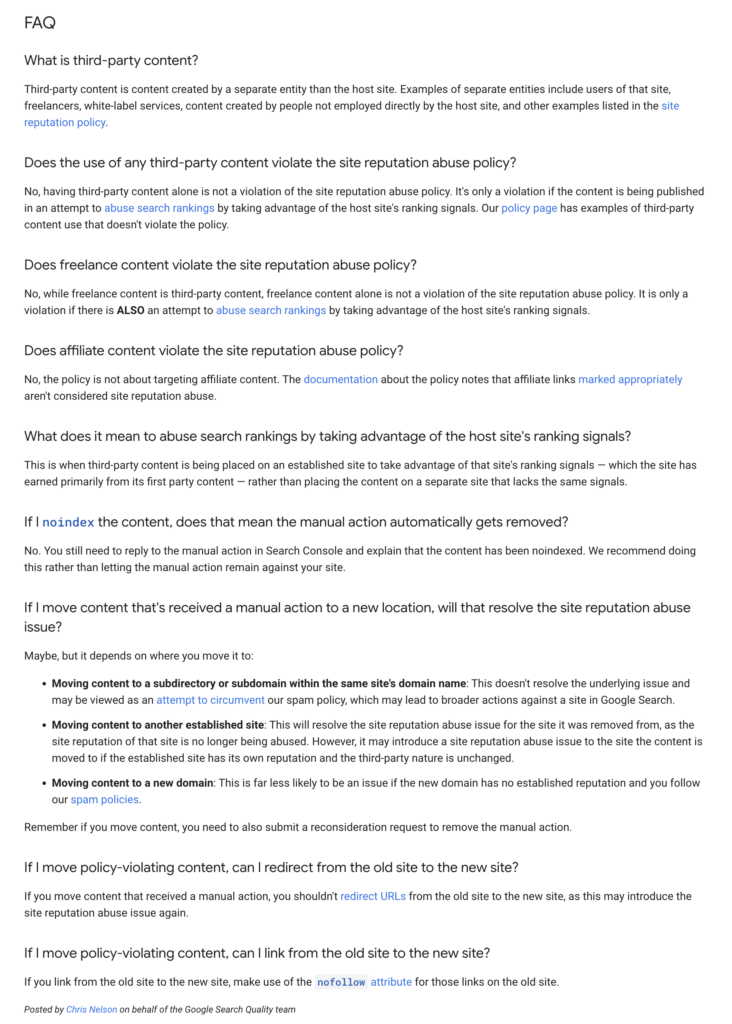
Recently Site Reputation Abuse and Google issuing manual actions (for sites like Forbes) have been favourite topic of mine and I have been tracking what’s going on. Since the day (19th Nov) Google updated the policy and started to issue manual actions for abuses of policy it was almost obvious if a specific site sub folder/domain will get it or not.
Hey if someone is abusing their site reputation to manipulate Google’s Search Results – I’m pretty sure they know what they are doing ☠️
But still there was some confusion amongst SEOs around affiliate content and how this policy applies to it and even I was bit confused about how Google will be reacting if a site moves their content around.
But now Google have provided some FAQs which I think is a good thing also for abusers of site reputation and for SEOs working with publishers who aren’t doing any abuse but would like to know where is the line of Site Reputation Abuse Policy & stepping which might lead to a manual action for them.
Here are my takes on all of FAQs – one by one
FAQ 1 – What is third-party content?
What is third-party content?
Third-party content is content created by a separate entity than the host site. Examples of separate entities include users of that site, freelancers, white-label services, content created by people not employed directly by the host site, and other examples listed in the site reputation policy.
Why this matter?
Google is now clearly saying that content created by freelances, white-label services, content created by people not employed directly by the host site is considered “Third-party” content. But we know that many publishers both big, medium size or even small ones use freelance writers for content. I think that its fine to continue using freelancer for content but where the line is if a freelancer written content is specifically leading to manipulation of Google’s Search Results.
Then in that case content written by freelancer (Third party) will lead to a manual action for abusing of Site Reputation.
Here is an example of this which I posted on X recently.
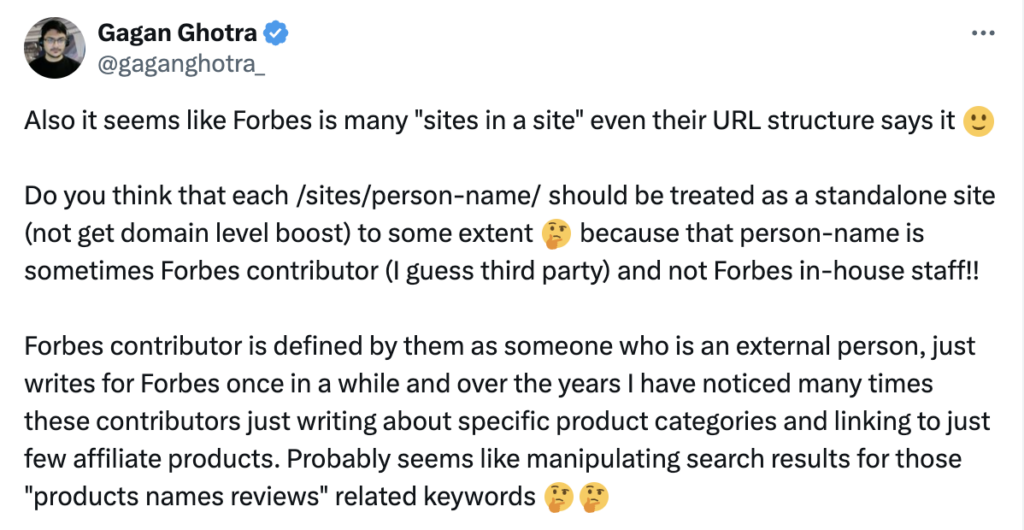
Over the years while doing SEO consulting for affiliate sites I have noticed a specific pattern /sites/person-name/ existence on this big publisher is to write affiliate content just around one specific product. Which of course means that whole purpose of that person to be a freelancer with this site is to leverage the domain signals to manipulate Google’s Search Results for keywords related to certain product reviews.
I think that this kind of activity will be something which will lead to a manual action for site reputation abuse policy while just employing freelances is totally fine, many publishers do this and even most of my current publishers clients also have freelancers from around the world along with their full time staff.
Therefore as a publisher Google is not discouraging to employ freelance writers, Google is just saying that if a freelancer is just writing on your site to leverage domain level signals and manipulate its search results for some keywords then its a problem otherwise having freelance writers is fine.
Also my general recommendation to publishers is to just declare the association of author with the site like on their author page just saying that they are freelancer!
FAQ 2 – Does the use of any third-party content violate the site reputation abuse policy?
Does the use of any third-party content violate the site reputation abuse policy?
No, having third-party content alone is not a violation of the site reputation abuse policy. It’s only a violation if the content is being published in an attempt to abuse search rankings by taking advantage of the host site’s ranking signals. Our policy page has examples of third-party content use that doesn’t violate the policy.
In the first FAQ which I have mentioned and explained above Google clearly defined what they are considering Third-party content in context of Site Reputation Abuse policy and with this question “Does the use of any third-party content violate the site reputation abuse policy?” answer being a clear No.
Google is saying that its ok to host third-party content unless and until its not leading to manipulation of it’s search results.
Here’s an example of this which I posted on X recently.
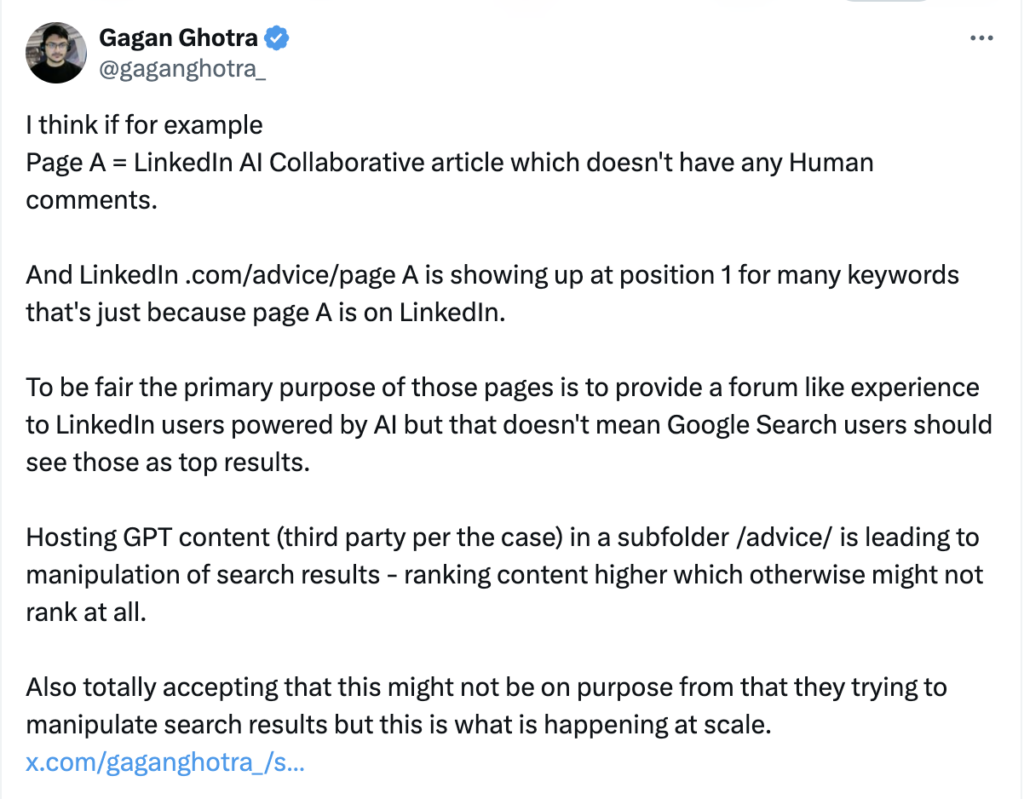
LinkedIn have been hosting AI generated content (GPT content) as Collaborative articles in their sub folder linkedin.com/advice/ although these pages allow to add comments by humans (LinkedIn users).
This is how these LinkedIn AI Collaborative articles look like

As these are mass generated – many of these don’t have any human added content. But still these pages rank really well in Google’s Search Results which if hosted on a domain other than LinkedIn wouldn’t be possible at all, I think same content on a random domain.
Google would have buried this GPT content on like 50th page of its search results.
This is what Google mean when they saying “It’s only a violation if the content is being published in an attempt to abuse search rankings by taking advantage of the host site’s ranking signals” for this question “Does the use of any third-party content violate the site reputation abuse policy?”
NOTE – In this example of LinkedIn I’m assuming GPT content hosted on /advice/ subfolder being Third-party although we don’t know if Google is considering same. I assumed they might but don’t know, also I recently posted a case on X (with some specific points to consider) that Google in context of site reputation abuse should consider GPT as Third-party.
FAQ 3 – Does freelance content violate the site reputation abuse policy?
Does freelance content violate the site reputation abuse policy?
No, while freelance content is third-party content, freelance content alone is not a violation of the site reputation abuse policy. It is only a violation if there is ALSO an attempt to abuse search rankings by taking advantage of the host site’s ranking signals.
I think its good that Google have said “It is only a violation if there is ALSO an attempt to abuse search rankings” which is important because Google also is now defining freelance content as Third-party. I have explained more about this with an example above (click on this to scroll above)
FAQ 4 – Does affiliate content violate the site reputation abuse policy?
Does affiliate content violate the site reputation abuse policy?
No, the policy is not about targeting affiliate content. The documentation about the policy notes that affiliate links marked appropriately aren’t considered site reputation abuse.
This is pretty much obvious!! Mark the links appropriately per the guidelines and its just fine to host affiliate content.
FAQ 5 – What does it mean to abuse search rankings by taking advantage of the host site’s ranking signals?
What does it mean to abuse search rankings by taking advantage of the host site’s ranking signals?
This is when third-party content is being placed on an established site to take advantage of that site’s ranking signals — which the site has earned primarily from its first party content — rather than placing the content on a separate site that lacks the same signals.
Why this matter?
I think that treating content differently and not passing on domain level boost is the best thing that could ever happen in history of Google Search & SEO. A publisher writing about 10 different topics (even couple of my clients do it too) all of those topics should be treated separately and therefore not get domain level boost.
This creates a level playing field for everyone and its not like if a site like let’s see for example CNN starts to write about socks tomorrow there content about socks should rank over any other site on the web – just because its CNN.
Also to handle these kind of situations properly Google recently said that they will (or perhaps even now – we don’t know for sure) start treating starkly different content from the main content on a site as a standalone site & will not be passing on domain level signals to that starkly content.
So in a hypothetical scenario that socks content from CNN will not be given domain level signals of CNN while considering it for ranking.
Hey this is what many big publishers have leveraged to rank for anything in Google’s Search Results!! 😂
FAQ 6 – If I noindex the content, does that mean the manual action automatically gets removed?
If I noindex the content, does that mean the manual action automatically gets removed?
No. You still need to reply to the manual action in Search Console and explain that the content has been noindexed. We recommend doing this rather than letting the manual action remain against your site.
This only matter for sites which got site reputation abuse manual action. They need to noindex the content and then apply for lifting of manual action.
Here are somethings which Google recommends to consider before applying for lifting of site reputation abuse manual action.
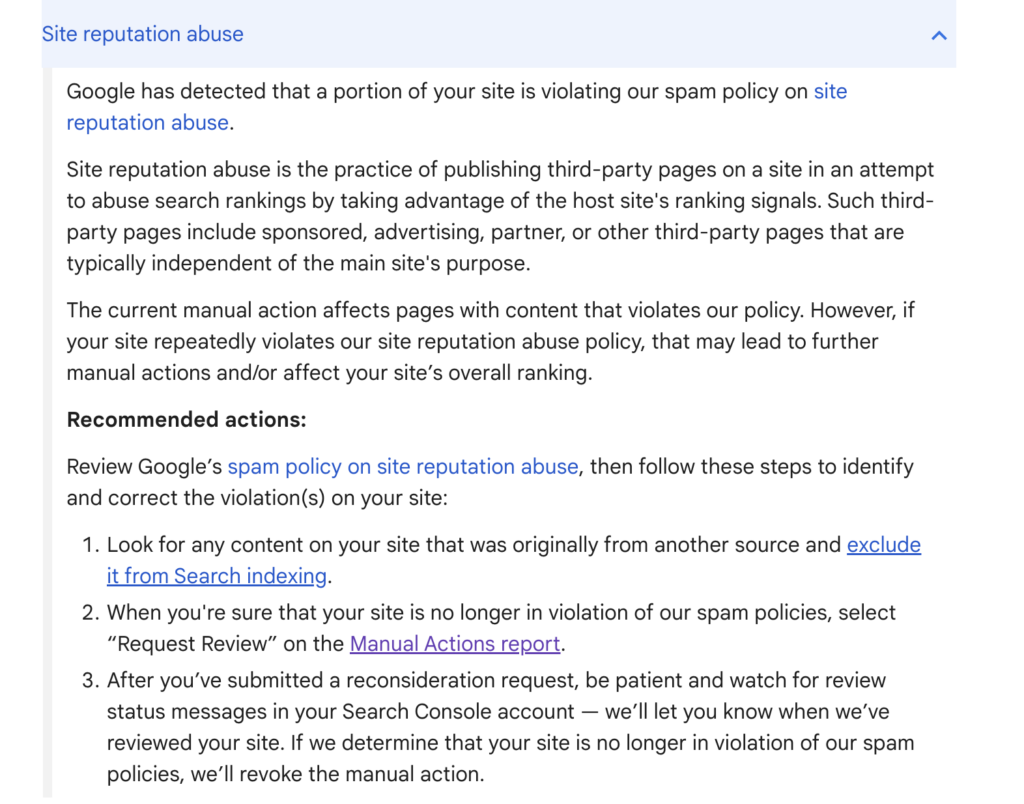
FAQ 7 – If I move content that’s received a manual action to a new location, will that resolve the site reputation abuse issue?
If I move content that’s received a manual action to a new location, will that resolve the site reputation abuse issue?
Maybe, but it depends on where you move it to:
- Moving content to a subdirectory or subdomain within the same site’s domain name: This doesn’t resolve the underlying issue and may be viewed as an attempt to circumvent our spam policy, which may lead to broader actions against a site in Google Search.
- Moving content to another established site: This will resolve the site reputation abuse issue for the site it was removed from, as the site reputation of that site is no longer being abused. However, it may introduce a site reputation abuse issue to the site the content is moved to if the established site has its own reputation and the third-party nature is unchanged.
- Moving content to a new domain: This is far less likely to be an issue if the new domain has no established reputation and you follow our spam policies.
Remember if you move content, you need to also submit a reconsideration request to remove the manual action.
To me Google including this in FAQs almost feels like someone from Google seeing what I posted on X on 3rd Dec and deciding to answer it.
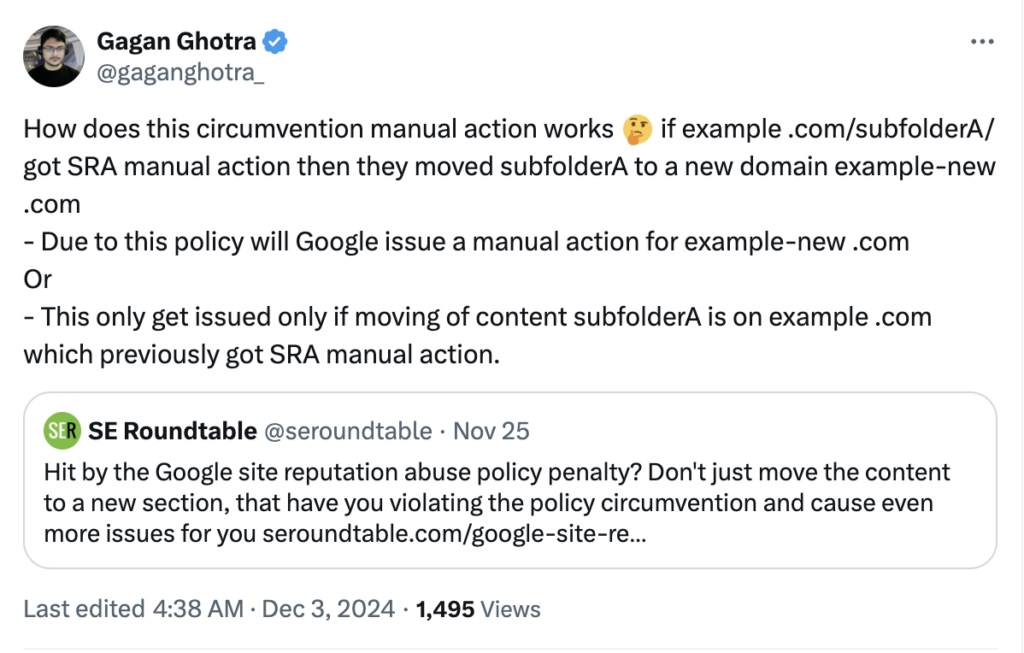
I posted this on X because on that day I got 2 similar inquiries from publishers hit by site reputation abuse manual action and they wanted to move the sub folders which were hit to new domains and setup redirects from current URLs to that new domain.
Glad that now Google have answered it clearly and saying that if site reputation abuse manual action for some sub directory or domain then moving it to another sub directory or domain will also be a site reputation abuse & for that Google may issue policy circumvention which may lead to site not showing up in search features like Top Stories, Google Discover and other serious actions too like these 👇

Also Google is now saying that if site reputation abuse policy affected content is moved from one domain established domain to another that may remove manual action for one but will create same issue for another domain.
Here the key is established domain because the domain level signals from that other domain will again lead to manipulation of Google’s Search Results and to control that Google has created this whole policy.
Also at the same time Google is saying if site reputation abuse policy affected content is moved to a new domain which don’t have any established reputation (I guess strong domain level signals) then it might be fine and for this Google is recommending to now go against their spam policies.
Also for this Google is recommending to some practices to follow which I have discussed below because Google mentioned these in two different other FAQs.
FAQ 8 and 9
If I move policy-violating content, can I redirect from the old site to the new site?
If you move content that received a manual action, you shouldn’t redirect URLs from the old site to the new site, as this may introduce the site reputation abuse issue again.
Got manual action for site reputation abuse and moving content from one to another site then don’t redirect because that will pass the site reputation abuse new another site too.
If I move policy-violating content, can I link from the old site to the new site?
If you link from the old site to the new site, make use of the
nofollowattribute for those links on the old site.
If moving site reputation abuse affected content from old to new site, then don’t setup redirects and also if linking to new site then make sure to use nofollow for those links.
Conclusion
Just don’t do Site Reputation Abuse – that’s it.
If doing already and haven’t got a manual action then sooner or later, those sites will get one and even I hope so because no one should be abusing Google’s Search Systems to manipulate the ranking of URLs.
Also here is what I’m looking forward to in context of Site Reputation Abuse.
(Recently I posted parts of this on X too)
- Manual actions for site reputation abuse goes global (right now it seems targeted towards certain publishers which are mentioned a lot online for abusing their reputation) better sooner than later or perhaps early next year would be fine too. Given Google Web Spam team might go on a break during holidays season.
- Algo for Site Reputation Abuse we don’t know when this is coming and even Google previously have said its not coming anytime soon but I think that Google should provide us an update around when to expect the algo.
- Starkly different content and treating it as standalone site in a site, not giving it domain level boost. This should be implemented at scale (I wish) but don’t know if and when Google will roll this out and I don’t even know if they will announce it or not.
Just need to wait!
Some additional things
Handling of forum users abusing domain level signals
This is just me reading the lines of FAQs in Site Reputation Abuse – Google Search Central. This might be what Google is or will be doing. I don’t know. I can’t say for sure! But this is my theory it can be true or not, I’m just not sure!!
Now in context of Site Reputation Abuse policy Google is defining content from “users of a site” as Third Party content.
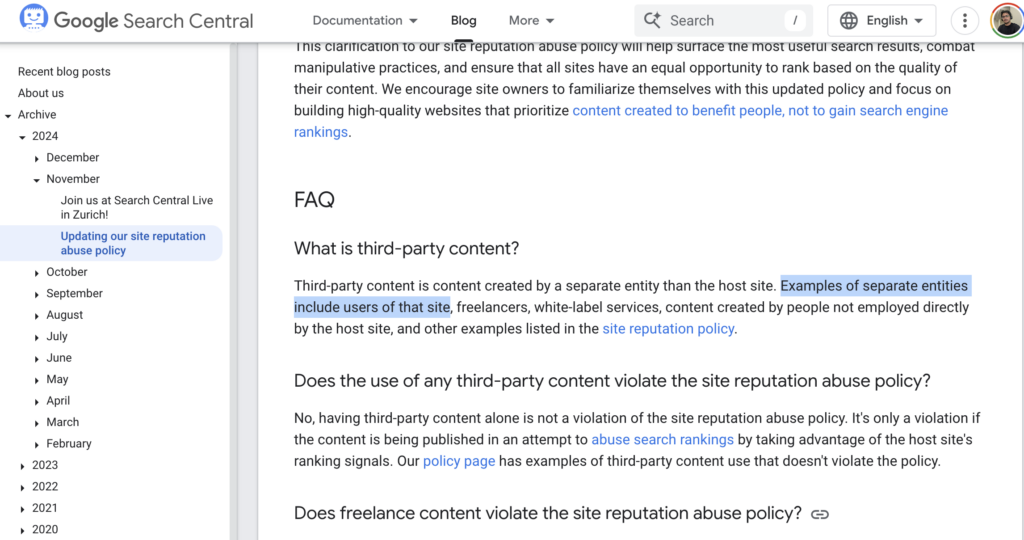
So I assume if a specific user of forums like Reddit or Quora try to leverage site level signals of those domains to manipulate Google’s Search Results that specific user’s content hosted on these forums will get a manual action.
Also given the scale of forums this is impossible to do manually, an algo will be needed for this.
Like for Reddit every thread there have Discussion forum schema and from there Google can pick up user profile URL and what they saying comment or post.

So Google can build cluster of a URL and content (post or comment) which can be used for doing analysis of content to see if there is any pattern of publishing parasite content which is leading to manipulation of Google’s Search Results.
But again this have to be algo based, Google’s Web Spam team can’t do this manually lol its beyond human capacity to do this kind of checking at scale of forums like Reddit and Quora.
Leave a Reply